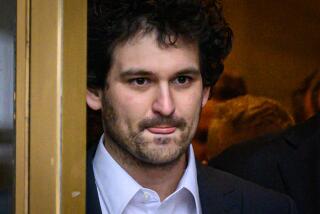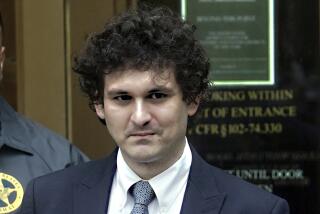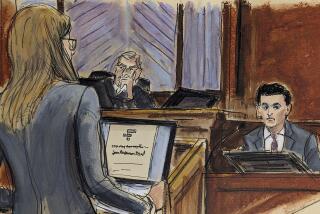Quattrone Testifies in Second Trial
- Share via
NEW YORK — Frank Quattrone, who gained fame betting on Silicon Valley start-ups, took another bold gamble Tuesday: testifying in his own defense at his retrial on obstruction charges.
Quattrone’s decision to take the stand during his first trial in October was widely considered to be a tactical blunder, as prosecutors tripped up the former investment banker in an apparent contradiction.
The latest testimony lacked such high drama but was nonetheless a pivotal moment as prosecutors bore down on Quattrone during a tense cross-examination.
Criticized by jurors as evasive in the first trial, Quattrone on Tuesday answered directly, and often with a broad smile, as prosecutors questioned his veracity and his motives for sending an e-mail to colleagues that lies at the heart of the case.
Quattrone is charged in a three-count federal indictment with trying to impede government investigations into whether his former firm, Credit Suisse First Boston, forced customers to pay kickbacks to receive shares of coveted initial public offerings at the height of the late-1990s technology-stock boom.
The case hinges on a two-line e-mail written by Quattrone in December 2000, in which he encouraged his staff to comply with an e-mail sent by another banker who instructed the staff to “clean up” IPO files.
Prosecutors say Quattrone’s message was aimed at vaporizing critical documents sought in probes by the Securities and Exchange Commission and a federal grand jury that threatened his perch atop Silicon Valley’s financial community.
Quattrone sent the e-mail just a few hours after a top CSFB lawyer advised him to hire his own attorney, in the expectation that Quattrone would be questioned by investigators.
The former star banker claims he was simply exhorting employees to follow CSFB’s policy of discarding unnecessary papers. He testified Tuesday that he didn’t decide how IPOs were allocated -- the key issue that supposedly was under investigators’ scrutiny -- and therefore had no need to thwart the probes.
Quattrone’s first trial ended in a hung jury.
As he took the stand Tuesday, Quattrone was first questioned by his lead attorney, John Keker.
Quattrone testified that he didn’t feel threatened by word of the investigations, saying he didn’t believe his technology banking team in Palo Alto was a target.
“This investigation seemed to me to be in another part of the bank,” Quattrone said.
“Did you believe you were in any kind of trouble?” Keker asked minutes later.
“Absolutely not,” Quattrone replied.
Keker also questioned Quattrone about the IPO allocation process. During his testimony in October, Quattrone maintained that he wasn’t involved in the process at all -- and was forced to beat a retreat when prosecutors presented e-mails showing his role in some allocations.
At the retrial, Quattrone’s defense team has made it clear that he was involved in IPO allocations, but has maintained that he played at best a minor role. Quattrone testified that of the roughly 100 tech IPOs that CSFB handled in a two-year span, he played a role in the allocations of “less than 10.”
In cross-examination, Assistant U.S. Atty. David Anders sought to show that Quattrone’s role in the IPO process was in fact much more significant. Anders pointed to an e-mail in which Quattrone told a staffer that he wanted to “get involved in some of the decisions on allocation.”
Anders also showed jurors four e-mails in which Quattrone was notified by others at CSFB that regulators were examining the allocation process, rather than final allocation decisions. The implication was that because he knew he had been involved in the overall process, Quattrone had a motive to blunt government probes.
In both trials, Quattrone has blamed CSFB lawyers for not telling him to preserve documents that had to be kept. Cross-examination is scheduled to resume today.
More to Read
Inside the business of entertainment
The Wide Shot brings you news, analysis and insights on everything from streaming wars to production — and what it all means for the future.
You may occasionally receive promotional content from the Los Angeles Times.










